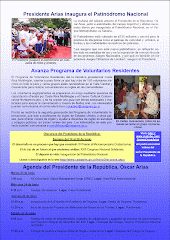In a Past Tense question, we use the auxiliary 'did' & the base form of the verb, e.g. "What did he practise yesterday?" We don't say, "What practised he yesterday?"
So why isn't 'did' used in Past Tense sentences such as: "What happened yesterday?"
The only explanation I could think of to give was that perhaps eons ago, we might have said, "What did happen yesterday?" but we don't use this form now.
Any explanation, theories, conjectures?
Thanks,
Shirley
Subscribe to:
Post Comments (Atom)
Blog Archive
Article in Weekly Bulletin of Casa Presidencial

We're making news!

Dear Shirley,
ReplyDeleteLooking at the examples you give in your post, I would say the following:
In questions like “What did he practice yesterday” (and this is not only in the past: “What DOES he practice today?”
English uses the auxiliary verb “do” which is fronted to preverbal position when the question has a subject OTHER THAN THE QUESTION WORD ITSELF.
[1] What does JOHN do for a living? (subject is “John”)
[2] Who did Mary marry? (subject is “Mary”)
[3] When did SHE arrive? (subject is “she”)
But when there is no subject other that the question word itself (WHO or WHAT), then there is no subject for the auxiliary verb DO to move in front of, so it is not used.
[4] What happened yesterday? (Subject is “what”)
[5] Who told you that? (Subject is “who”)
By the way, “What did happen yesterday” is neither ancient nor unused. It is used in cases where special focus is required.
[6] a. That is not what happened yesterday!
b. Well then, what DID happen yesterday.
Ron Ross
Shirley,
ReplyDeleteI should add that DO is not the only auxiliary verb used that way in questions (moved to pre- subject position):
[1] You have seen that film.
[2] Have you seen that film?
[3] You are going on vacation in September.
[4] Are you going on vacation in September?
[5] You will see her in Paris.
[6] Will you see her in Paris?
[7] He is coming tomorrow.
[8] Is he coming tomorrow?
[9] You can talk to her for me.
[10] Can you talk to her for me?
[11] You must talk to them.
[12] Must you talk to them?
[13] Your kids should see that movie.
[14] Should your kids see that movie?
Etc.
Thank you, Ron! I had been scratching my head over Shirley's question for several days now. That is perfect...
ReplyDeleteMy pleasure, Katherine.
ReplyDeleteRon
Hi Ron:
ReplyDeleteI used to have a grammar expert friend on whom to foist these questions but he passed away. Now I've got you, yippee!
Thanks very much. I will try to get that into my head. The other examples you gave for pre-subject position are 'be', 'have' & the modals, is that right?
Thanks again, Shirley
Cheers,
Shirley
That's right, Shirley. Most linguists support the position that English has two kinds of auxiliaries: modal auxiliaries and non-modal auxiliaries (except for government and binding theory). "Have" and "be" are non-modal auxiliaries.
ReplyDeleteI'll be happy to be of assistance whenever I can.
Cheers to YOU,
Ron
Hi Ron:
ReplyDeleteWould you kindly EM me directly? Since my questions re grammar are not directly related to MultiLingue, I feel they should be answered off-line to: shellpb@yahoo.com
Thanks again for your help,
Shirley
Ah - but please keep discussing these things on the blog, as well! That's exactly what this forum is for! (The "do" explanation has already come in handy for me in working with English language learners.)
ReplyDelete